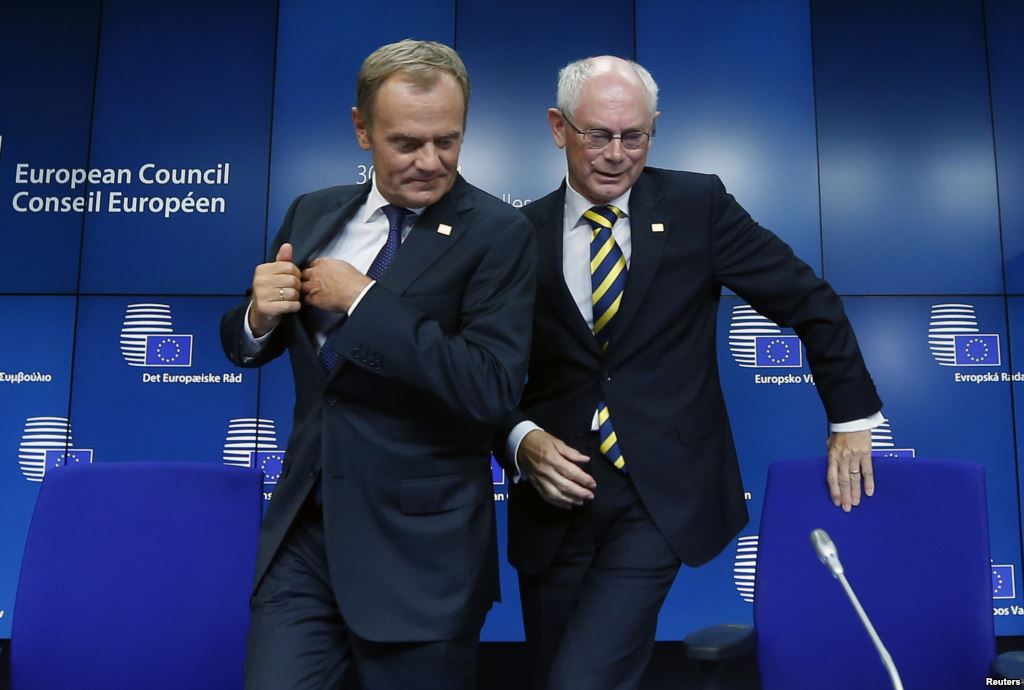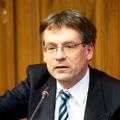Adam Malczak
On December 1st Donald Tusk will replace Herman Van Rompuy as the permanent President of the European Council. Will he be able to tame the political chaos in Brussels and across the continent?

photo: Reuters
In the last 25 years that followed the Polish transition from communism, the domestic political landscape was almost entirely dominated by factions and individuals brought to prominence by the Solidarity revolution. A handful of them achieved what we could describe as international recognition (think names like Wałęsa, Balcerowicz, Belka, Kaczyński). Only one of them, however, managed to subdue internal mechanisms of Polish politics, achieve electoral success at home and ascend to the new leadership team of the European Union.
Donald Tusk, once an ordinary boy from the shipyard city of Gdańsk, will soon hand in his resignation as the Prime Minister of Poland after 7 years in office, only to assume the presidency of the European Council on December 1st. This phrase contains an awful lot of precedents for a Polish politician. Tusk is the longest serving chief of government in post-communist Poland - his Civic Platform party was the first one to get re-elected since 1989. Moreover, never has the incumbent Polish prime minister resigned voluntarily without major drop in his party's pollings, only a few months after winning (though narrowly) European Parliament elections. And lastly, never has a Polish politician held an international office so prestigious before.
These words, written 25 years ago, would have appeared as no more than a joke to anybody who lived in the grey reality of painful economic transition. And it would especially appear so to a young activist who chose politics as his only profession - Donald Tusk. How has he done it then?
The Guy from the Neighbourhood
Notwithstanding his transformation throughout the years, the key to his success was always hidden in his modest, ordinary biography. Tusk hails from a small ethnic minority called the Kashubs, living in the northern parts of the country, speaking they own dialect. His father, who bore the same name, was a carpenter and died when young Donald was in primary school. He was mostly raised by his mother, a nurse, whom he often mentioned in a handful of interviews relating to his private life.
In one of them, he spoke of the vital moments that made him a fervent opponent of communism. In December 1970 the government suddenly increased prices of food, sparking outrage amongst the workers in cities in northern Poland. The military violently crashed on the protesters, mostly from shipyards and nearby factories, killing 41 people and injuring over a thousand. Although he was only 13 at the time, he spoke of the tragedy as one that would eventually make him decide to go into politics.
For most of young Poles in the 1970s and 1980s who despised communist regime, university was the place where they started to engage in political activism. Even before graduating, he got married and would soon have two children to care for. For many years, he would live in a single room at the university campus with his wife and son. To pay for his wedding, he earned the money by cleaning ships docking in the city port. Later, in between writing for independent opposition newspapers and distributing leaflets, he would earn his family's living as a construction worker, usually refurbishing or demolishing high-rising cooling towers.
Since the early years, his greatest passion - politics excluded - was football (making him similar in this respect to his Hungarian counterpart Victor Orban). He would always find time to play the game at least once or twice a week. Even upon becoming the prime minister, he would keep his routine and play with fellow party members or ministers.
Quite unsurprisingly, for most of his time in politics before reaching its peak both his opponents and allies would not treat Donald Tusk seriously, precisely because of his biography. They would always say he prefers to be kicking the ball on the field rather than engage in political manoeuvring (he was once photographed watching a football match whilst presiding over parliamentary session). They mocked he was always late to meetings and reportedly took long naps in his office when he was chairing a small parliamentary faction in early 1990s.
Now we know that for both his political friends and foes to disdain Tusk was probably the largest mistake they could ever make. Whilst he was changing into a genuine homme politique over the years, his laid-back attitude and image as an 'ordinary guy from the neighbourhood' would give him the advantage he needed to shake the political arena dominated by Solidarity heroes or alienated intellectuals.
How the liberal Tusk lost with the Chaos
Before he learns the hard lessons of Politics 101, young Tusk - along with a group of likeminded friends establishes a peculiar association of intellectuals and aspiring politicians. It is peculiar not because of the people, but the direction it took. Contrary to the dominant political forces of early 1990s in Poland - post-communist left and post-Solidarity right - Tusk and his companions were driven by staunch liberal ideology. As Mariusz Janicki and Wieslaw Wladyka write in the recent edition of Polityka weekly, they were exceptional as they focused on "economics, systemic transformation and inspired by the English liberal thought (...). The liberals were an open right, underlining freedom of all sorts, looking for ideas for the modernization of Poland, reluctantly revisiting the past or exploiting martyrdom or Solidary-related symbols".
Donald Tusk of the early 1990s is the man of his ideology. Defender of the free market, he was advocating for unreserved privatization. In 1991 his first party - Liberal-Democratic Congress - enters the new parliament. His liberalist group is on the rise - the same year Jan Krzysztof Bielecki becomes, alas very briefly, President's Walesa pick for the prime minister.
During this time, the future President of the European Council is not a frontman of his party. He is not even an active parliamentarian, but he gets recognition amongst local structures for his clear (liberal) views.
As with most Polish politicians, too much ideology prevents him from identifying the nature of political struggle in a reality of economic transformation. Janicki and Wladyka again quite rightly put it: "The Liberal party bore the costs of transformation because they gave their face to the large-scale privatization, but they did not have another, social face". His party would take the blame for all the hardships and scandals that rocked the newly-born democracy. Pure liberalism was always selling badly in Poland.
More importantly, however, Tusk learned his lesson as a politician by failing to recognize that instead of ideological axioms or power mechanisms, Polish politics after the communist era was ruled by chaos - a mixture of individuals' ambitions, unreasonable affiliations and forces external to politics itself. This is why the left failed to modernize and become a genuine social-democratic bloc and opted instead to simply re-brand and wait for the right to dissolve. The parties of the right were also doomed to fail, but for the exactly opposite reason. Maintaining a unified political force proved impossible to over-ambitious intellectuals or union leaders from the Solidarity circles. The sad testimony to this description is the 1997 electoral victory of AWS - the Solidarity Electoral Action. Their time in government virtually destroyed this bizarre alliance of rightist parties, the coalition fell apart before the end of the parliament's term and the AWS did not win enough votes to get a single seat in 2001.
Moulding the New Tusk
For the future prime minister, the first 15 years of his political career proved to be both a stunning string of defeats and an educational experience. One could point out three "formative" moments in his long path to the top of Polish political scene.
His first lesson came in 1993, when the Liberal-Democratic Congress (only after 2 years of participation in various governing coalitions of myriad parliamentary factions) was punished by voters and failed to enter the parliament. Tusk lost his seat and - consequently - his belief in liberalism and politics altogether. For a few years he retreated and published books about his hometown of Gdańsk.
After his return he prepared himself to challenge the contemporary state of political scene and play on his terms. In 2001 he co-founded the Civic Platform (PO - Platforma Obywatelska) - a party that was both fresh in approach and programme. A lot of his liberal friends joined and inspired the ideas of the new party, but PO was far from putting forward ideology-driven policies. But more importantly, the Civic Platform almost religiously avoided any association with the old parties (or more accurately - with being a party at all). Tusk sought to break the status quo by giving PO the odium of a social movement, comprising activists and not politicians; giving people what they need rather than telling them what they should be getting. Lastly, throughout the next years he managed to secure his party from the destructive force of individual ambitions - by marginalizing and getting rid of any potential competitors or, indeed, successors.
Donald Tusk was still a rather relaxed politician back then, especially for a person poised to become the country's next president. In early 2005, his Civic Platform was leading the polls and Tusk had a comfortable lead over his opponent in the presidential elections - Lech Kaczyński. And then he suddenly lost. The rising force on the right - Kaczyński brothers' party PiS (Law and Justice - Prawo i Sprawiedliwość) attacked Tusk's manifesto and juxtaposed his 'liberal Poland' with their 'Polish solidarity' slogan. In a final blow, one of the PiS MPs revealed that Tusk's grandfather served in the Wehrmacht (later it emerged that he was forcibly drafted after being imprisoned in a concentration camp). A couple of months later, Civic Platform lost to PiS in parliamentary elections.
The double defeat of 2005 was the last of major political transformations for Donald Tusk. As Michał Majewski and Paweł Reszka - two political reporters that tracked his path to the top - describe - it not only made him tougher. It made him vigilant. Maintaining his charm and appeal, he could become a ruthless and relentless politician, a lethal combination to his political foes.
.jpg)
Donald Tusk (right) being appointed as Prime Minister by the PresidentLech Kaczyński on 9 November 2007 (photo: Wikipedia)
Tusk's opponents hold on two power for mere two years. These were a striking reminiscent of the early days of modern Polish democracy. Minor coalition partners, radically rightist or populist parties constantly undermined the Kaczynski's government which nevertheless attempted to increasingly project the state's authority. After all, PiS ran on a platform involving tackling organized crime, big business fraud and corruption across political and economic circles. Instead, a series of scandals revealed, ensuing questionable moves by state prosecutors as well as the secret services' violent arrests and searches were exploited by the opposition against the government. In a famously controversial intervention by the internal security force in April 2007, a former leftist construction minister committed suicide while the officials where searching her house. Jarosław Kaczyński (twin brother of the then-President) could hold for no longer. Embattled prime minister decided to ask voters to support his course and relieve him of the continuing political instability. And again, he was the one to make the mistake of passing off Tusk as a potential threat.
In 2007 Donald Tusk finally gets the reward for his transformation and efforts to learn how to play the Polish politics. And he played it better than anybody else. Of all the most liberal and radical ideas previously put forward by the Civic Platform, his government backtracks on almost all of them: flat tax, unicameral parliament, abolishing public funding of political parties etc. Tusk focuses on scaling up the investment programme in infrastructure (one of the famous initiatives was the state budget support for the construction of football pitch in each municipality). In the international arena he opts to put out fires in Poland's relations with both Germany and Russia and restore the country's image abroad.
As prime minister, Donald Tusk adopts what was famously dubbed as 'the policy of hot water in the tap' - instead of implementing major reforms, the government policies should respond to and satisfy current needs of the citizens. Along with unquestionable mastery of PR, coinciding with utter indolence of the opposition from both left and right of the spectrum, Tusk survived the financial crisis, the Smolensk plane crash that killed President Lech Kaczynski and many prominent officials and manages to achieve the impossible: he becomes the first prime minister since 1989 to become re-elected. Drawing on lessons he learnt before, he broadened the appeal of the Civic Platform - he was using his charm to attract the social-democratic and more right-wing voters, and hence solidify its place in the centre. On an institutional level, he turned Civic Platform and its government into a 'one leader's party'. He eradicated internal opposition, avoided promoting ambitious and increasingly popular politicians to ministerial positions. That also turned the PO into a cartel party - the term Peter Mair used to describe a political organization employing the state's resources and mechanism to support and maintain its rule. This approach certainly proved substantial in maintaining control over the political forces. Paweł Reszka, in a recent article for Tygodnik Powszechny entitled "Mr Pure Power" recalls a former acquaintance of Tusk as saying that after securing the PO's re-election Tusk seemed to become an admirer of "pure power - without the benefits, without the grandeur. As if he was excited by sheer act of governing". However, after 7 years in government, the popularity of both Tusk and his party started to wither away. As such, some could say that the offer to move to Brussels job arrived at just about the right time for Tusk to leave the domestic politics. Michal Szułdrzyński, leading commentator for Rzeczpospolita daily interestingly notes, that Tusk perhaps did not want to leave, but he may have had to do it.
How the pragmatic Tusk won with the Chaos
In a way, the new Tusk that succeeded in winning re-election and getting the top EU job is a product of the chaotic nature that haunts the modern Polish politics. He understands that ideology plays a minor, if not negligible role, and party-affiliations are secondary to people's electoral choices. He correctly observed that one can survive through the chaos only by entirely subjugating their own political party. And with no remorse he acknowledged that friendships or fair play have no place in politics.
But given the above, he still retained his image as the friendly guy that plays football and understands your daily concerns. The dilemma is this: is it still who he is, or has the politics changed him? Truth be told, for a regular Polish or EU citizens it matters little. Politicians do not win elections, their public images do.
On December 1st Donald Tusk will replace Herman Van Rompuy as the permanent President of the European Council. Will he be able to tame the political chaos in Brussels and across the continent? What his vision of Europe is? We are yet to find it out. Aside from general enthusiasm about the EU and more integration, Tusk was - as with anything else in recent years - reluctant to take a definitive stance. Perhaps this will prove to be the key to the pragmatic Europe of Donald Tusk.
Author's bio:
Adam Malczak is a political scientist, activist and commentator. Currently he is the Vice-President of the Institute for Democracy Standards in Warsaw - a think-tank focused on issues of political culture and ethics. He graduated from the Department of Political Economy at King's College in London and is now a Master's student at the Department of International History at London School of Economics. He was previously the President of United Nations Association - Poland and an advisor to the Polish Minister of Interior.
Twitter: @Adam_Malczak



